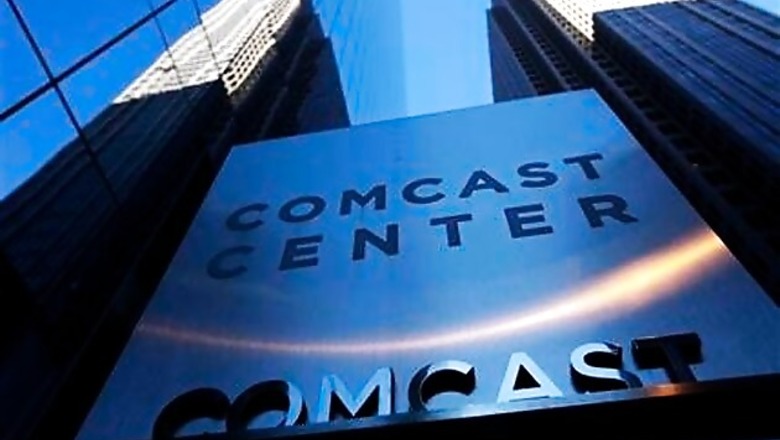
views
New York: Don't expect major changes to how you access your favourite websites and services despite a federal appeals court's decision to set aside rules meant to ensure equal access to entertainment, news and other online content.
Major cable providers already have pledged not to do the kinds of things the rules were designed to ban. And the rules didn't apply fully to wireless providers anyway, even as Americans are increasingly using mobile devices to access Internet content.
Under so-called net neutrality rules adopted in 2010 by the Federal Communications Commission, wired broadband providers such as Comcast, Time Warner Cable and Verizon were barred from prioritising some types of Internet traffic over others. That means a cable company couldn't hinder access to Hulu and other Internet video services, even though they compete with the company's own TV services.
Under some interpretations, a broadband provider also couldn't charge services such as YouTube and Facebook for preferential treatment, such that users could reach those services faster than those that don't pay.
The anti-discrimination and anti-blocking rules were designed to preserve an open Internet and ensure that startups and nonprofits had as much of a chance to reach an audience online as established companies such as Google.
Broadband providers had flexibility to deal with congestion and unwanted traffic, such as spam, but their traffic-management policies had to be disclosed. Otherwise, providers must ensure access to all legal online content, applications and services over their wired networks.
On Tuesday, a three-judge panel of the US Court of Appeals for the DC Circuit affirmed that the FCC had authority to create open-access rules. But in a setback for the Obama administration's goal of Internet openness, the court ruled that the FCC failed to establish that its 2010 regulations don't overreach.
The judges said those regulations treated all Internet service providers as common carriers - a general term for airlines, utilities and other transporters of people or goods for the general public on regular routes at set rates. But the court said the FCC itself already had classified broadband providers as exempt from treatment as common carriers, which set up a legal contradiction.
The decision empowers leading Internet providers to decide which Internet services - such as Netflix movies, YouTube videos and news stories - they would allow consumers to access over their networks. In some cases, Internet providers can demand that Google, for example, pay them to ensure that YouTube videos are accessible to all their consumers, or Google could pay extra to ensure that YouTube videos are delivered faster.
FCC Chairman Tom Wheeler said the commission will now consider its options, including an appeal, to ensure that networks on which the Internet depends provide a free and open platform.
The FCC also could draft new rules, or Congress could change the 1996 telecommunications law that gave the commission different authority depending on whether a company was a common carrier or not.
Even if the ruling stands, the effect on wired broadband access is expected to be minimal.
Concerns about discrimination grew in 2007 after The Associated Press ran tests and reported that Comcast Corp. was interfering with attempts by some subscribers to share files online through a service called BitTorrent. Although Comcast said it did so because BitTorrent was clogging its networks, public interest groups grew worried that broadband providers were becoming gatekeepers of online content. After all, the files exchanged through BitTorrent included video, something that threatens Comcast's cable TV business.
Comcast's actions drew rebuke from the FCC and a pledge by all of the major broadband providers including Comcast not to discriminate. The 2010 rules were meant to ensure that such open access continued. Still, critics worried that restrictions on how providers manage their networks would discourage investments.
Verizon, which filed the case against the FCC, said Tuesday's court decision "will not change consumers' ability to access and use the Internet as they do now."
It said the decision "will allow more room for innovation, and consumers will have more choices to determine for themselves how they access and experience the Internet. Verizon has been and remains committed to the open Internet."
Wireless is where there's less certainty.
The 2010 rules barred Verizon and other wireless carriers from blocking competing services, such as Internet calling applications and websites run by rivals. They also had to allow access to all legal websites though a phone's Web browser, regardless of whether they are competitors.
But carriers were allowed to block stand-alone apps - a common way of accessing services on mobile devices - as long as the apps didn't directly compete with them. The rules also gave wireless carriers more leeway to manage data traffic because there's less capacity over the airwaves.
And the rules said nothing about charging customers for access. Last week, AT&T announced a "1-800" toll-free equivalent for wireless data. Websites that pay for the service will be toll free for AT&T's wireless customers, meaning the traffic won't count against a surfer's monthly allotment of data. AT&T said the practice complies with the FCC's rules because, apart from the billing, traffic from the sponsoring sites will still be treated the same as other traffic on the network.

















Comments
0 comment